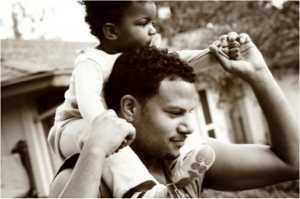In June I was asked to join a debate in the New York Times about fathers and parenting discussions. The question posed was a provocative one: despite the fact that “today’s dads…change diapers and shake up the P.T.A.,” fathers remain marginal in “the national conversation” about parenting. Simply put, the debate’s creator wanted to know why “we still think of ‘parenting’ as ‘mothering’?” Here is what I wrote in response.
The premise of this forum is that dads rarely appear as active participants within parenting disputes and debates.
I disagree.
As someone who has been studying fatherhood for over two decades, I can say with certainty that men have not been left out. Leading scholars declared it a hot topic as far back as the 1990s, and in the last decade there has been an explosion of research on fathering. In fact, I am writing this piece while attending the inaugural Work-Family Researchers Network Conference in New York City where American and international researchers are discussing both fathering and mothering with equal vigor.

